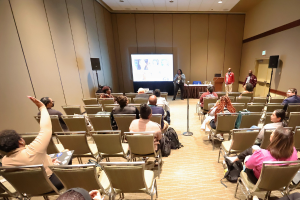
By Malenah Hunter, Associate Director of Membership and Awards, AACRAO
Do you work at a Historically Black College or University? Did you graduate from an HBCU? Do you just wish you went to an HBCU? Nearly 300,000 students attend close to 100 historically Black colleges with focuses ranging from agriculture, aviation, law, and STEM. HBCUs offer curricula that reflect Black students' cultural and historical experiences, and are even taught by Black professors. Black students come from various cultural backgrounds and socioeconomic environments. Yet, those who attend an HBCU have higher levels of self-esteem and feel more connected to and fulfilled by their educational experience.
Working at an HBCU offers a unique and fulfilling experience that blends rich cultural history with the opportunity to impact the lives of future generations. This session explored the distinctive aspects of working at an HBCU and how faculty, staff, and administrators can find joy and purpose in their roles.
Meet the Presenters:
- Kimberly Sanders, Associate Dean of Student Affairs and Enrollment Management, University of Incarnate Word School of Osteopathic Medicine
- David Williams, Law Registrar, North Carolina Central University School of Law
- Reginald Garcon, Associate Vice President: Student Records & University Registrar, University of Maryland - Eastern Shore
The Joys and Benefits of Community
HBCU graduates are more likely to continue their education and pursue higher degrees. They have often been hot spots of activism, allowing for students to come together on issues they care about and protect each other. Since the beginning, the mission of Black colleges has always been to educate and uplift people of all races, meaning that many of these institutions accept and serve non-Black students.
Businesses see evidence that a diverse workplace is the best approach to success. HBCU institutions pride themselves on preparing Black students for leadership roles and establishing a job pipeline by partnering directly with large and small businesses looking to hire promising Black candidates.
Taking the ‘B’ out of HBCU?
With the current administration and the concerns surrounding Diversity, Equity, and Inclusion initiatives and efforts, HBCUs have begun facing something that feels akin to the very struggles of their legacy: How can you remove the “Black” from a historically Black college designation?
While many other institutions evaluate compliance levels in a confusing and chaotic time, asking an HBCU to take down, scrub out, and erase its foundations can feel like a targeted attack. A history of being unwelcome in higher education spaces prompted founders to create their own to change the narrative and keep the history going for future generations. To imply that an HBCU's entire mission to raise all races while celebrating all things Black is somehow wrong and financially punishable feels like being set up to fail.
While HBCUs may have more questions than answers, the work can’t stop. It’s crucial to the history and culture to plant the seed early and provide every resource possible to young Black students, so that they know what an HBCU is, where it can take them, and what it contributes to the greater good.
“HBCUs must be kept alive for our babies,” is a shared belief among many who are invested in this legacy.
Historical and Cultural Significance
HBCUs were established because African Americans were not allowed to learn or attend higher education institutions, and they wanted a way to educate themselves because it meant freedom. Since the Civil War, these institutions have been a safe haven and played a crucial role during segregation.
HBCUs represent Black identity, help nurture pride, and foster leadership and community. To many, it can feel like a family experience when you step onto an HBCU campus, and there’s an immediate sense of belonging when students see people who look like them and have had the same or similar experiences.
For some, it’s the first time they don’t feel like the only one in the room. There are no extra barriers or challenges to feeling accepted by their peers, which instills great pride in who they are and where they come from. The culture and tradition are present and affirming.
Challenges Common to HBCUs
When people think about HBCUs, they might think about homecoming, Greek life, athletics, and many famous alumni. And while these aspects are celebrated, they’ve also inadvertently contributed to the many misconceptions surrounding these institutions.
There has been a long history of HBCUs being systemically underfunded despite producing some of the highest percentages of Black doctors, lawyers, judges, scientists, and more. States have had to introduce lawsuits to recover even a tiny amount of what they owe.
They have had to fight against perceptions of inferiority like low-quality education, unprofessionalism, and lack of infrastructure, and these criticisms are often perpetuated by the very people these institutions serve.
It’s not uncommon to hear people discourage attending an HBCU because of the lack of opportunities.
Sometimes, outdated policies can make it even harder for students to return to school and thrive once they’ve faced a setback in their education.
When there is so much choice and not enough knowledge of what more an HBCU can offer Black students, these institutions face drops in enrollment, a growing trend across higher education in general. Still, it’s felt even more at the smaller, lesser-known schools that quietly close and are often not heard about or considered.